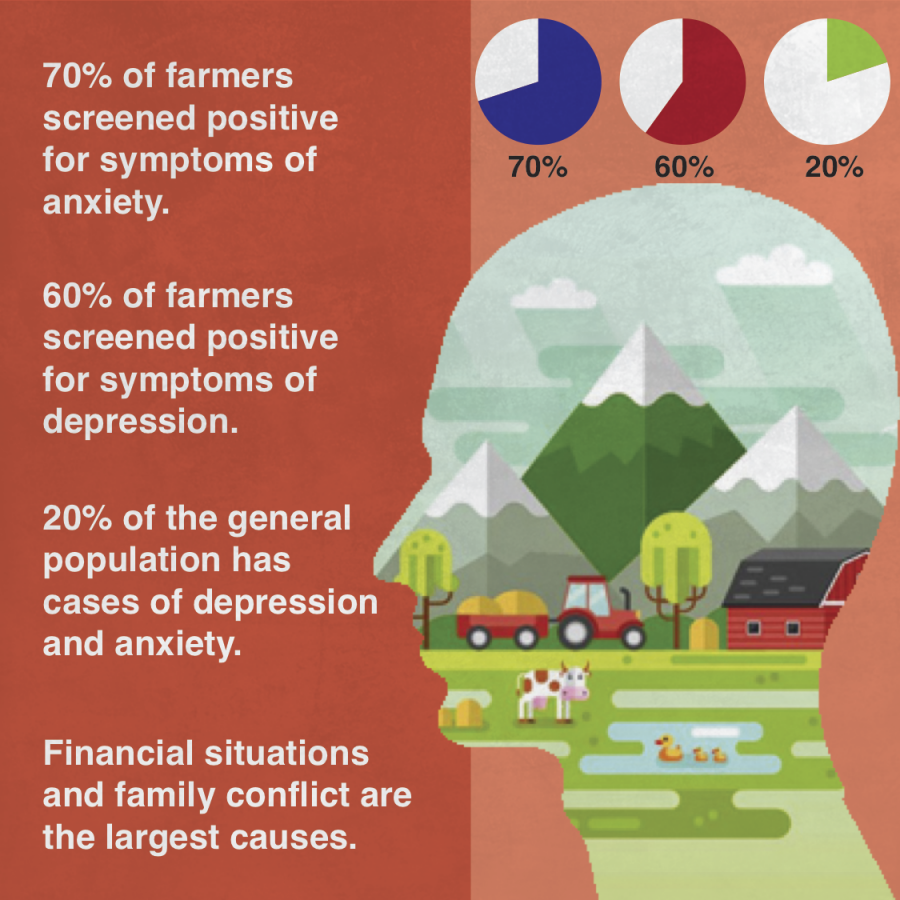Program advocates mental health for farmers
Program aims to improve access to mental health resources
March 12, 2020
Researchers in ACES have found mental health for farmers and people in rural communities is a growing concern. Some ACES faculty hope to combat this problem with workshops to increase awareness and improve access to mental health resources.
According to Josephine Rudolphi, assistant professor in ACES, a majority of farmers experience symptoms of mild anxiety or depression, and farmers were estimated to be the profession with the seventh or ninth highest suicide rate overall. She attributes this problem to substance abuse and the social stigma and perception of mental health treatment. Rudolphi added many rural areas are being underserved by the health care system overall.
“We are interested in farmers’ mental health when the farm economy suffers a downturn from bad prices or terrible weather,” Rudolphi said. “We also found that people who reported more interpersonal relationship stress or time pressures were more likely to report symptoms of anxiety and depression. This involves factors such as labor shortages and farm succession that won’t go away, even if prices rebound.”
Rudolphi hopes to combat the growing problem by organizing “Agricultural Mental Health and Stress Management” programs across Illinois. According to Rudolphi, the goal of these programs is to connect local farmers with mental health resources and provide techniques to relieve stress, as well as to raise awareness about the problem. This includes an Agricultural Mental Health Summit that took place in Bloomington, Illinois, on March 4.
“We’re really hoping that it is a collaborative day where people can either share their resources or innovative products that they’ve created, and other people who have been desperate for these products can take them home and use them,” said Rudolphi about the summit. “We want to increase distribution and dissemination of resources that are available, and we also want to identify what we still do not have and what we are missing as a state. We want to see how the UI Extension can fill that gap.”
Get The Daily Illini in your inbox!
The research indicated several sources of stress for farmers, including economic and interpersonal stress that contribute to the problem. Courtney Cuthbertson, professor in ACES who also has been researching this topic, said many students and faculty at the University may be affected as well.
“There are a lot of us that work with folks in rural communities or have farming in our background,” Cuthbertson said. “There are a lot of students on campus who come from farming backgrounds or have family in rural areas and have lived experiences of some of these issues.”
Frank Gorthison, freshman in ACES, said although he did not feel the need to use mental health resources on campus, he could understand that the farming profession could cause some anxiety. He thought there could be an ethical component contributing to the stress as well.
“It’s an ever-growing field that is, of course, essential, if not growing in importance due to growing populations,” he said. “There are a lot of ethical issues we learn about, especially environmental ones; that can be kind of worrying. Learning about methane emissions and unsustainable practices regarding soil was pretty eye-opening.”
There is still a shortage of formal mental health care providers in rural communities, and 61% of health professional shortage areas are in the rural parts of the U.S., according to Cuthbertson. However, Cuthbertson said even ordinary students can contribute to assist others.
“So many people are worried about the stigma or what people might think,” Cuthbertson said. “By sharing our own stories, it helps to break the stigma down, and that includes on campus as well as the communities we come from, whether they’re urban or rural, farming or not. Everyone can play a role in breaking the stigma, and everyone can play a role in learning more about how to help someone who might be having a hard time.”







